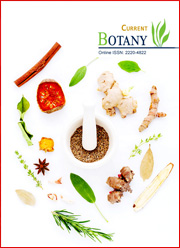Pathophysiology of Angiogenesis and Novel Angiomodulators from Plant Sources for Therapeutic Purpose
Abstract
The formation of a ‘tumor –associated vasculature’, a process referred to as tumor angiogenesis, is a stromal reaction specific for tumor angiogenesis. Angiogenesis, the development of new blood vessels from the existing vasculature, is important for normal developmental process. Angiogenesis is an essential step for the progression of solid tumors. Uncontrolled angiogenesis is a major contributor to a number of disease states such as cancer, inflammatory disorders, Obesity, asthma, diabetes, multiple sclerosis, AIDS, bacterial infections, autoimmune diseases, endometriosis. It is also considered a key step in tumor growth, invasion and metastasis. Thus anti-angiogenic therapy is one of the most promising approaches to control tumor growth. Angiogenesis is required for proper nourishment and removal of metabolic wastes from tumor sites. Angiogenesis may be a relevant target to inhibit tumor progression. The anti-angiogenic molecules reported to date many are plant compounds, peptides, chemokines, cytokines, nanoparticles, siRNA, Flavonoids and Chalcones, monoclonal antibodies, soluble receptors, to vascular growth factors and growth factor receptors, soluble receptors and fragments derived from extracellular matrix proteins. Therefore, modulation of angiogenesis is considered as therapeutic strategies of great importance for human health.
Numerous bioactive compounds from plant sources and other antiangiogenic compounds are recently tested for their antiangiogenic potential. Those compounds inhibits angiogenesis and metastasis through regulation of multiple signaling pathways. Those antiangiogenic compounds regulate the expression of VEGF, MMPs, EGFR, and inhibit NFkB, PI-3K/Akt, ERK signaling pathways, there by causing strong anti-angiogenic effects. Thus, anti-angiogenic compounds are emerging as leading molecules among the plethora of compounds with anti-angiogenic activity.
This review article describes the latest development using anti-angiogenic inhibitors to down regulate various angiogenic and tumor –associated factors, both in biological assays and in animal disease models. The majority of research efforts are currently focused on understanding gene function, as well as proof-of- concept for antiagiogenesis compounds mediated anti-angiogenesis process.
In this article, we will review some of these molecules particularly from plant based sources and discuss their mechanism of action and their potential therapeutic use as anticancer agents in humans.
Key words: Tumor angiogenesis, Vascular endothelial growth factor, Cancer, Bioactive compounds, Peptides, Antibodies, Nanoparticles, Flavonoids, Chalcones
Manoj G Tyagi et al. Pathophysiology of Angiogenesis and Novel Angiomodulators from Plant Sources for Therapeutic Purpose. J Phytol 2/11 (2010) 13-24




 .
.